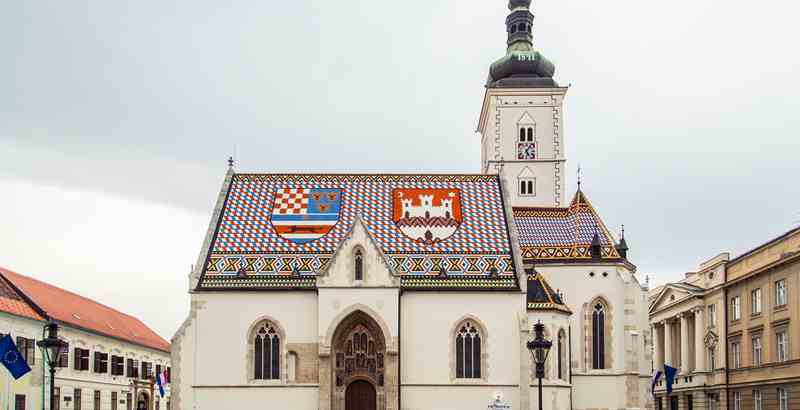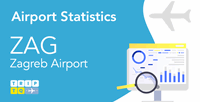
Renting A Car In Zagreb
A Guide for Tourists and Business Travelers Looking to Rent a Car in Zagreb, Croatia
Renting a car can be an excellent way to explore the city and surrounding areas. With so many car rental companies available in Zagreb, it can take time to figure out where to start.
We've compiled this guide for tourists and business travelers looking to rent a car in Zagreb. From choosing the right company and navigating driving directions from the airport to understanding rental terms and avoiding fees, we've got you covered.
Choosing the Right Car Rental Company in Zagreb
With so many options available in Zagreb, deciding can be overwhelming. Before booking your rental car, take some time to research different companies and compare prices.
- One essential factor to consider is the age of the fleet. Newer cars are usually more reliable and efficient than older ones. You'll also want to check if the company offers 24/7 roadside assistance in emergencies.
- Another thing to keep in mind is insurance coverage. Some companies may offer basic coverage, while others provide comprehensive plans that include theft protection and collision damage waiver.
- Customer service is another aspect that should be considered. A reputable company will have knowledgeable staff who can answer questions about your rental agreement or driving regulations in Croatia.
To compare prices or book a rental vehicle, see more information about car rental services in Zagreb.
Car Rental Options in Zagreb
Onsite car rental options include Avis, Hertz, Europcar, and Budget. These companies offer a range of vehicles, from economy cars to luxury models. Those who prefer local car rental companies from the airport terminal also offer competitive rates and personalized service.
When selecting a car rental company in Zagreb, consider price, insurance coverage options, and convenience of pickup/drop-off locations. It is recommended that you book your car in advance online before arriving at Zagreb Airport. This will ensure the availability of your preferred vehicle type during peak travel seasons.
Driving Directions from Zagreb Airport
Driving directions from Zagreb Airport are straightforward, but make sure you plan your route ahead of time and pay attention to local rules and regulations while on the road. It is located around 17 kilometers from downtown Zagreb and is well-connected by several major roads. If heading towards the city center, follow signs for A3/E70 or take D31 if you want a more scenic route through nature.
In general, the roads in Croatia are well-maintained and easy to navigate. However, some smaller towns may have narrow streets or limited parking options. It's also important to note that some areas may have tolls on highways or bridges. Ensure you carry enough cash or use credit cards accepted at these toll stations.
Benefits of Renting a Car in Zagreb
Having your own rental car allows you to explore at your own pace. You won't have to worry about finding public transportation or scheduling tours. Instead, you can create your itinerary and visit all the must-see attractions on your list.
- Another great benefit of renting a car is convenience. You'll save time by not waiting for buses or taxis, which means more time for sightseeing or attending work meetings.
- Renting a car provides comfort on long journeys. You can choose the type of vehicle that best suits your needs and preferences - from compact cars perfect for solo travelers to larger vans ideal for groups.
- If you plan on visiting nearby cities outside of Zagreb, like Split or Dubrovnik, having access to a rental car makes it easy. No need to worry about train schedules or buying multiple tickets – hop into your rental car and hit the road.
What are the terms and conditions of the rental car agreement in Zagreb?
Take some extra time when reviewing your lease agreement, as there could be important details that need attention before finalizing any deal with a car rental company in Zagreb. These agreements can vary from company to company, so choose a reputable one.
One of the most crucial aspects of these agreements is liability coverage. In case of an accident or damage to the vehicle during your rental period, liability coverage will protect you from paying for damages out-of-pocket. However, carefully review what's included before signing on.
Another important aspect is fuel policy. Most car rental companies require renters to return vehicles with a full gas tank or face additional refueling charges. Fees and charges may also apply if you exceed mileage limits specified in your agreement or return the vehicle later than the agreed-upon time frame.
What documents are needed before a foreigner can rent a car in Zagreb?
The documentation requirements may vary from one rental company to another. However, most companies will require your passport or identification card, driver's license, or an international driving permit.
Your driver's license must have been valid for at least 12 months and should be issued by your home country. It's worth noting that some rental companies may require drivers who hold licenses from non-EU countries to present an International Driving Permit (IDP).
Learn more on how to obtain an International Driving Permit for driving in Croatia.
If you are stopped on the road at any time, uniformed personnel may request you to present your passport or other identifications. Your passport is essential as proof of identity and confirms that you can legally be in Croatia.
If you transport your own or a rented vehicle into the country, authorities may ask you for proof of ownership. So if you plan on renting a car in Zagreb with a non-EU driving license, ensure you get an IDP.
It's advisable always to check ahead with the specific car rental company what their document requirements are before booking so that you can ensure smooth processing of paperwork upon picking up your rented vehicle.
What payment methods are available for international customers?
International customers have several payment options. The most common method of payment is by credit card. Most major credit cards in Croatia are accepted by rental companies, including Visa, MasterCard, and American Express.
It's important to note that the credit card used for the rental must be in the primary driver's name. In addition, some rental companies may require a security deposit when renting a car with a credit card.
Another option for international customers is paying with cash or debit card. However, not all rental companies accept these forms of payment, and those may require additional documentation or deposits.
Many car rental companies also offer this option for those who prefer to pay online before arriving at their destination. This can be done through their website or third-party booking platforms.
When choosing a payment method, read and understand the terms and conditions of each company, as they may differ from one another. It's also worth noting any additional fees associated with each form of payment, such as currency conversion fees or transaction charges.
Tips for Avoiding Rental Car Fees and Charges
- Make sure to return the car on time. Many rental companies charge a fee if you return the car late, so plan ahead and allow enough time for traffic or unforeseen delays.
- Inspect the vehicle thoroughly before driving off with it. Please take note of any scratches, dents, or other damages already present on the vehicle and report them to the rental company. Failure to do this could result in being charged for existing damages when returning the car.
- Fill up your gas tank before returning the rental car. Some companies will charge an exorbitant amount per gallon if they have to refill it themselves. Also, try not to add unnecessary extras like GPS systems or satellite radio, as these can quickly increase costs.
- Drive safely and avoid accidents which can lead to additional fees and charges such as damage waivers and insurance deductibles.
What are the rules for parking and driving in Zagreb?
There are generally two types of parking: the blue zone and private lots. The blue zone is marked with blue lines on the street and requires payment for parking during certain hours. Private lots are also available throughout the city, often near popular destinations like museums or shopping centers. However, these usually require payment as well.
When driving in Croatia, watch for speed limits and road signs, which vary depending on location. It's important to note that using your phone while driving is strictly prohibited and could result in fines.
If you plan on traveling outside of Zagreb, ensure you have all necessary documents, including your driver's license and rental car agreement. Additionally, always wear your seatbelt while driving - safety should always come first.
For reliable and affordable parking options, see available parking locations in Zagreb.
What should a foreigner do when driving in Zagreb for the first time?
- You'll need a valid driver's license from your home country, and if your document is not written in English or Croatian language, an international driving permit (IDP).
- Renters must be at least 21 (though some rental companies require only 18) and have a legitimate driver's license. If you are younger than 25, you may be assessed for an extra fee. The same rule applies to drivers over the age of 70.
- Motorists drive on the right-hand side of the road in Croatia and overtake on the left. Always wear seat belts while driving, as it's mandatory. Consider using GPS or maps to help navigate unfamiliar roads.
- Speed limits vary depending on the location and type of road you're driving on. In built-up areas, speed limits range from 30-50 km/hour, while outside built-up areas, it increases up to 90 km/hour on local roads.
- Get familiar with local traffic laws and road signs. Take extra caution when navigating roundabouts and intersections, as they may differ from those in your home country.
What should you do if the cops pull you in for a traffic violation?
- Remain calm and polite when interacting with the police officer. Remember that they are just doing their job; treating them will go a long way.
- Comply with any requests from the officer, such as providing your identification or registration documents. Failure to do so may result in further legal repercussions.
- It is important to understand that fines for traffic violations in Croatia can vary depending on the severity of the offense and can be quite steep. It's advised to pay these fines promptly to avoid further legal complications.
- If you feel that you have been unfairly treated or fined by law enforcement officers during your rental period, contact your car rental company immediately for assistance and advice on how to proceed.
What if the car breaks down during the rental period?
Experiencing a car breakdown during your rental period in an unfamiliar location can be frustrating and stressful. Knowing what steps to take when you find yourself in this situation is essential.
- Contact the car rental company immediately and inform them of the issue. They may provide instructions on how to proceed or offer assistance if necessary.
- If safe, move the vehicle off the road and turn on the hazard lights. Check for any warning messages or indications on the dashboard that could help diagnose the problem further.
- Call 112 for assistance from local authorities or towing services in an emergency. It's also important to have travel insurance that covers roadside assistance and medical expenses.
- Remember to attempt repairs with prior approval from the rental company, as this could void their insurance policy. Provide accurate information about what happened, including the location and time of the incident.
- Having a reliable car rental provider offering roadside assistance will put your mind at ease, knowing they have covered you in case something goes wrong during your trip.
What to do if you're involved in a traffic accident?
The driver must ensure everyone involved is safe and call for medical assistance if necessary. Once everyone is safe and the situation has been attended to, it's time to exchange information with the other driver(s) involved.
Be sure to gather their name, phone number, address, license plate number, and insurance information. Taking photos of any damages done to your vehicle or theirs can also provide additional evidence should it be needed later on.
After exchanging information with the other driver(s), contact your car rental company immediately so they can guide you on what needs to be done next. Keep all related documents, such as police reports and medical records, organized throughout this process.
Remember that keeping your calm throughout this situation is key - accidents happen, but staying level-headed will help ensure that everything gets taken care of smoothly without further complications.
What other transport options are available in Zagreb?
One of the most popular means of transportation is the tram system which covers almost all parts of the city. The trams operate frequently and offer an affordable way to get around.
Another option is taking a taxi, which can be found at designated stands or hailed on the street. It's important to ensure that the taxi you choose has a visible meter and that you agree on a price before starting your journey.
For those who prefer two-wheels, bike rental services are available throughout the city. Cycling is eco-friendly and allows visitors to explore Zagreb at their own pace. Bus routes connect different parts of Zagreb with its surrounding areas.
Trains provide access to cities outside Croatia, such as Vienna, Budapest, and Belgrade. Ride-sharing apps have become increasingly popular and offer an easy way to get around without worrying about cash payments or language barriers.
To easily navigate the city with convenience and cost-effectiveness, see available transportation options in Zagreb.
What must-see attractions I can visit using a rental car in Zagreb?

Zagreb boasts a rich cultural and historical heritage that attracts tourists all year round. There are several must-see attractions in Zagreb that visitors should add to their itinerary.
One such attraction is St. Mark's Church, located in the heart of the Upper Town. Its colorful tiled roof displays the coat of arms of Zagreb on one side and Croatia on another, making it an iconic symbol of both places.
Another popular attraction is Ban Jelačić Square, a central meeting point for locals and tourists. Surrounded by shops, restaurants, and cafes, it's a great place to relax and soak up some atmosphere.
For those interested in art and history, The Croatian Museum of Naive Art houses an impressive collection of works by self-taught artists worldwide. It's worth strolling through this museum to admire its unique exhibits.
Visitors can also walk along Tkalciceva Street - one of Zagreb's oldest streets with charming architecture dating back centuries ago. Here you will find street performers playing music or painting portraits while enjoying traditional food at any local restaurant lining up this lively strip.
If you're traveling during winter, be sure not to miss out on Advent in Zagreb for one of Europe's best Christmas markets featuring ice-skating rinks, mulled wine stalls & live music concerts spread throughout various locations across town, creating magical Christmas vibes perfect for everyone.
From religious sites like St. Mark's Church to museums showcasing Croatian artistry, such as The Museum Of Naive Art, has many landmarks worth exploring within this vibrant city, so make sure your itinerary includes these must-see tourist attractions before departing.
There is a wide array of tourism attractions in Zagreb that you can visit - see more about the best tourism offerings in Zagreb.
What types of hotels and accommodations are available in Zagreb?
The price range for hotels and accommodations in Zagreb can vary greatly depending on the quality of the hotel or accommodation. Generally, budget-friendly options such as hostels and Airbnb rentals start from around 20 Euros per night. Mid-range hotels may cost anywhere from 40 to 80 Euros per night.
High-end luxury resorts are also available for those willing to spend more - these can easily set you back over 100 Euros per night. Ultimately it depends on your budget and what type of experience you want when choosing a hotel or accommodation in Zagreb.
To compare prices or book a hotel for your stay in the city, see detailed information about finest hotels and accommodations in Zagreb.

FREE Cancellations, NO card fees!

Value Options View Offers
Useful Information about Zagreb Airport

Zagreb Airport has experienced a steady increase in passenger traffic, evident in the numbers recorded in September 2023.
View...
In August 2023, Zagreb Airport welcomed a remarkable 2% more passengers compared to the same month in 2019, a pre-pandemic benchmark.
View...
Passenger Numbers Rise by 7.62% in Q2 2023 at Zagreb Airport, Surpassing Pre-Pandemic Levels of Q2 2019
View...
See all the airport lounges, locations and opening times available at Zagreb Airport
View...